Snowflake developers are at the heart of data-driven decision-making processes. They manage and optimize data storage and retrieval using Snowflake's cloud data platform, enabling organizations to leverage their data effectively.
Skills required for a Snowflake developer include proficiency in SQL, understanding of cloud computing fundamentals, and experience with data warehousing solutions. Additionally, they need strong analytical and problem-solving abilities.
Candidates can write these abilities in their resumes, but you can’t verify them without on-the-job Snowflake Developer skill tests.
In this post, we will explore 7 essential Snowflake Developer skills, 9 secondary skills and how to assess them so you can make informed hiring decisions.
Table of contents
7 fundamental Snowflake Developer skills and traits
The best skills for Snowflake Developers include SQL Expertise, Data Warehousing, Snowflake Architecture, Data Security, Performance Tuning, Cloud Integration and Scripting Skills.
Let’s dive into the details by examining the 7 essential skills of a Snowflake Developer.
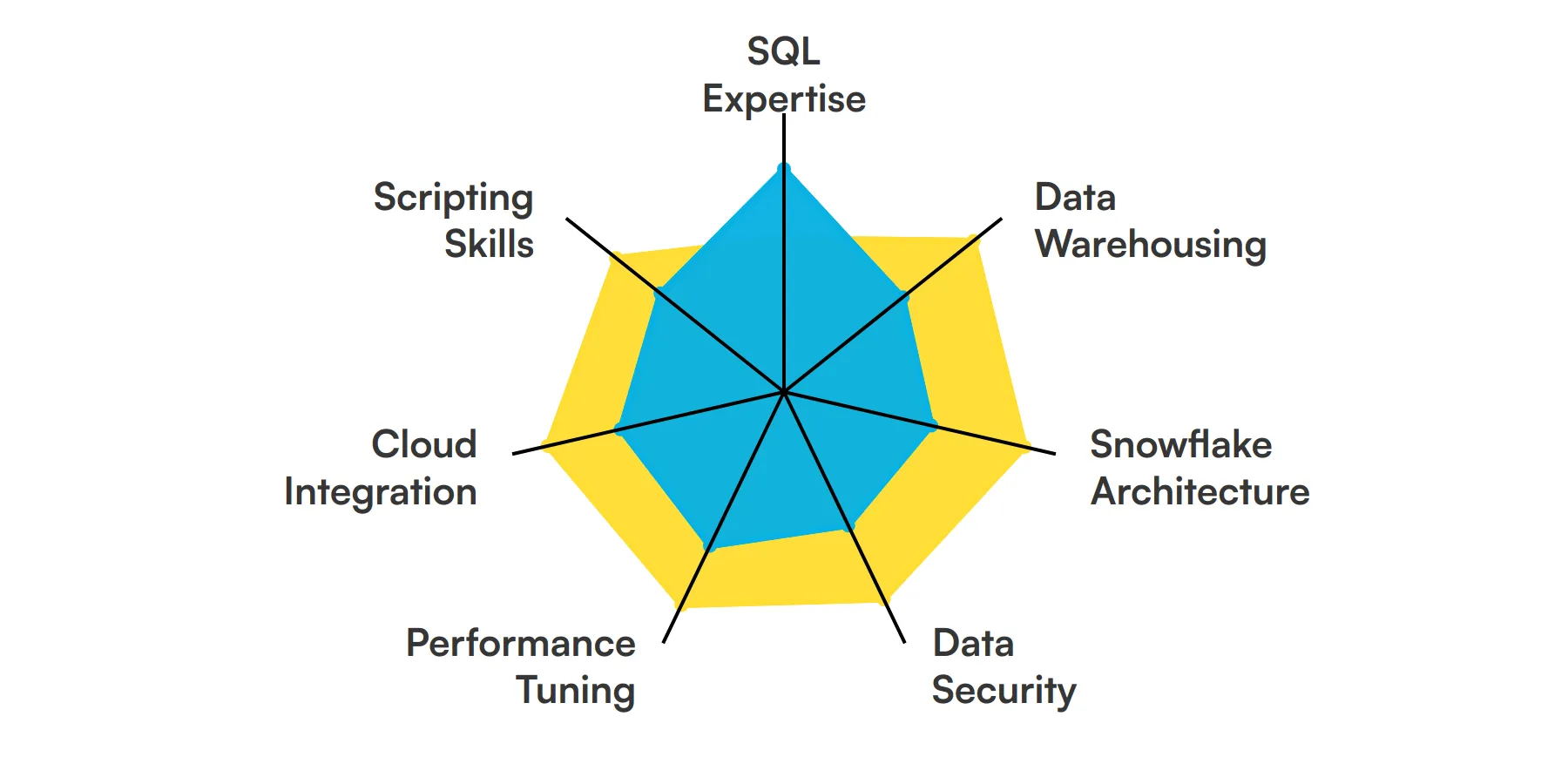
SQL Expertise
A Snowflake Developer must have a strong command of SQL, as it is the primary language used for querying and managing data within Snowflake. This skill is necessary for designing efficient data models, performing data transformations, and optimizing queries to ensure high performance and scalability in data operations.
For more insights, check out our guide to writing a SQL Developer Job Description.
Data Warehousing
Understanding the principles of data warehousing is key for a Snowflake Developer. This includes knowledge of data warehousing architectures, ETL processes, and OLAP systems. The developer uses this skill to effectively organize large volumes of data and implement data storage solutions that support business intelligence and analytics.
Snowflake Architecture
Familiarity with Snowflake's unique architecture, including its use of virtual warehouses, storage layers, and caching mechanisms, is essential. A Snowflake Developer leverages this knowledge to optimize data storage and compute resources, ensuring cost-effective and efficient data processing.
Check out our guide for a comprehensive list of interview questions.
Data Security
Implementing and managing data security measures within Snowflake is a critical skill. This involves setting up roles, managing access controls, and ensuring compliance with data protection regulations. A Snowflake Developer needs this skill to safeguard sensitive information and maintain trust in data management practices.
Performance Tuning
The ability to tune and optimize the performance of Snowflake environments is crucial. This includes query optimization, resource management, and scaling strategies. A Snowflake Developer uses this skill to enhance the speed and efficiency of data processing, directly impacting the performance of business applications.
Cloud Integration
Snowflake operates on cloud infrastructure, so knowledge of cloud services like AWS, Azure, or GCP is important. A Snowflake Developer uses this skill to integrate Snowflake with various cloud services and manage data across different platforms, enhancing the flexibility and scalability of data solutions.
For more insights, check out our guide to writing a Cloud Engineer Job Description.
Scripting Skills
Proficiency in scripting languages such as Python or JavaScript is beneficial for automating tasks and integrating Snowflake with other tools and systems. This skill allows a Snowflake Developer to streamline workflows, automate data processing tasks, and enhance overall productivity.
9 secondary Snowflake Developer skills and traits
The best skills for Snowflake Developers include Data Modeling, Business Intelligence, Project Management, Data Migration, API Development, Machine Learning, Version Control, Continuous Integration and Documentation Skills.
Let’s dive into the details by examining the 9 secondary skills of a Snowflake Developer.
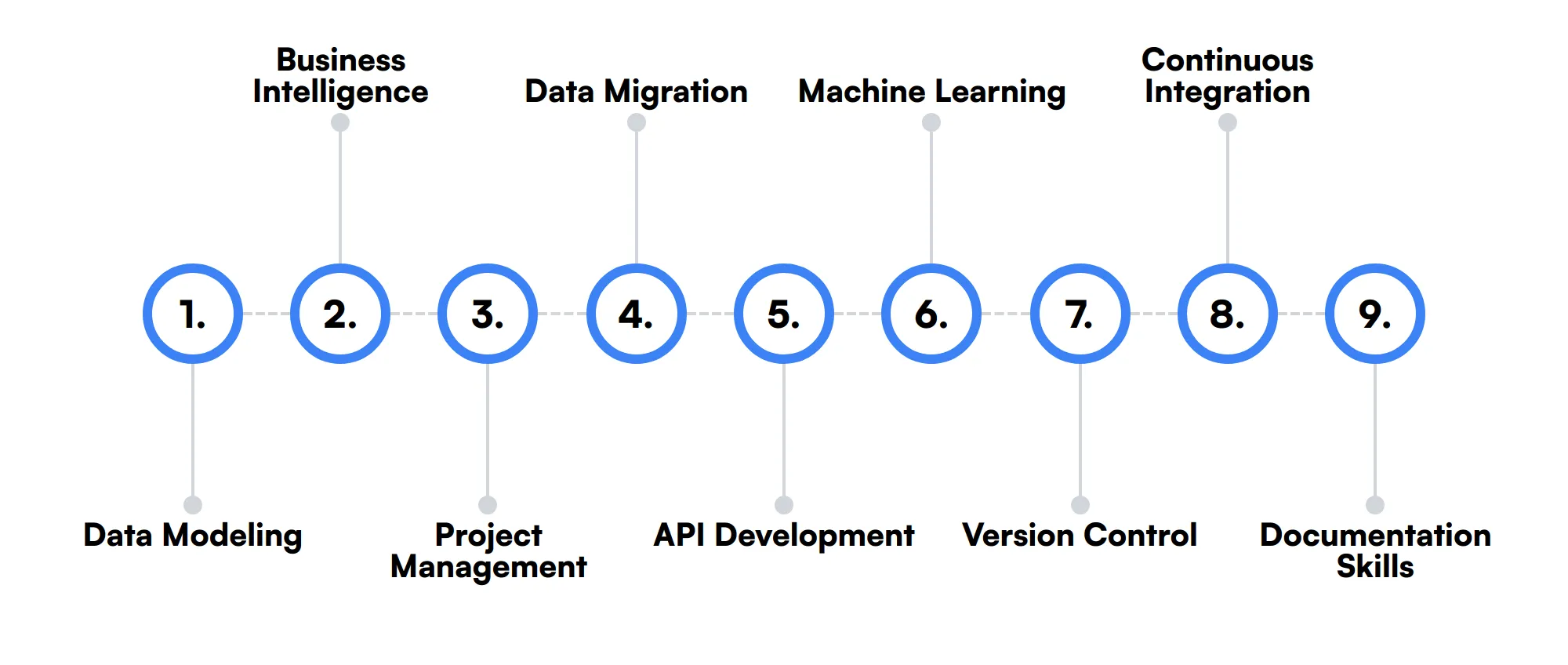
Data Modeling
Ability to design and implement data models that effectively capture, store, and retrieve data. This skill supports the primary data management tasks within Snowflake.
Business Intelligence
Experience with BI tools and techniques is useful for creating reports and dashboards that help businesses make informed decisions based on the data stored in Snowflake.
Project Management
Skills in managing projects and coordinating with teams are beneficial for overseeing the development and implementation of Snowflake-based data solutions.
Data Migration
Experience with data migration strategies and tools helps in moving data to Snowflake from different sources, ensuring smooth transitions and minimal downtime.
API Development
Knowledge of API development enables integration of Snowflake with other applications and services, facilitating data exchange and expanding functionality.
Machine Learning
Understanding of machine learning techniques can be advantageous for implementing advanced analytics within Snowflake, enabling predictive analytics and data insights.
Version Control
Familiarity with version control systems like Git is useful for managing changes in the development environment, ensuring consistency and collaboration among team members.
Continuous Integration
Experience with CI/CD practices is valuable for automating the testing and deployment of Snowflake configurations, promoting a more agile development process.
Documentation Skills
Ability to produce clear and comprehensive documentation is important for maintaining records of the data architecture and processes implemented in Snowflake.
How to assess Snowflake Developer skills and traits
Assessing the skills and traits of a Snowflake Developer can be a challenging task, given the diverse range of expertise required. From SQL proficiency to understanding Snowflake's unique architecture, a comprehensive evaluation is necessary to ensure the candidate is well-suited for the role.
Traditional resumes might highlight qualifications, but they often fall short in demonstrating a candidate's practical abilities and fit for your specific needs. Skills-based hiring practices, such as talent assessments, provide a more accurate measure of a candidate's competencies.
For instance, Adaface on-the-job skill tests can help you achieve a 2x improved quality of hires by focusing on real-world scenarios. These assessments cover key areas like data warehousing, performance tuning, and cloud integration, ensuring you find the right fit for your team.
Let’s look at how to assess Snowflake Developer skills with these 6 talent assessments.
SQL Online Test
Our SQL Online Test evaluates a candidate's ability to design and build relational databases, manage tables, and write efficient SQL queries including joins and subqueries.
The test assesses their understanding of database operations such as CRUD, views, indexes, and advanced SQL functions like string manipulation and mathematical calculations.
Successful candidates demonstrate a thorough understanding of SQL transaction management, security measures, and the ability to optimize queries for performance and scale.

Data Warehouse Online Test
Our Data Warehouse Online Test measures expertise in data warehousing concepts, including the design and maintenance of data storage solutions.
Candidates are tested on SQL basics, ETL processes, and data modeling techniques, including ER diagrams and normalization.
The assessment includes questions on building and managing fact tables and understanding data warehousing fundamentals to ensure candidates can handle complex data environments.
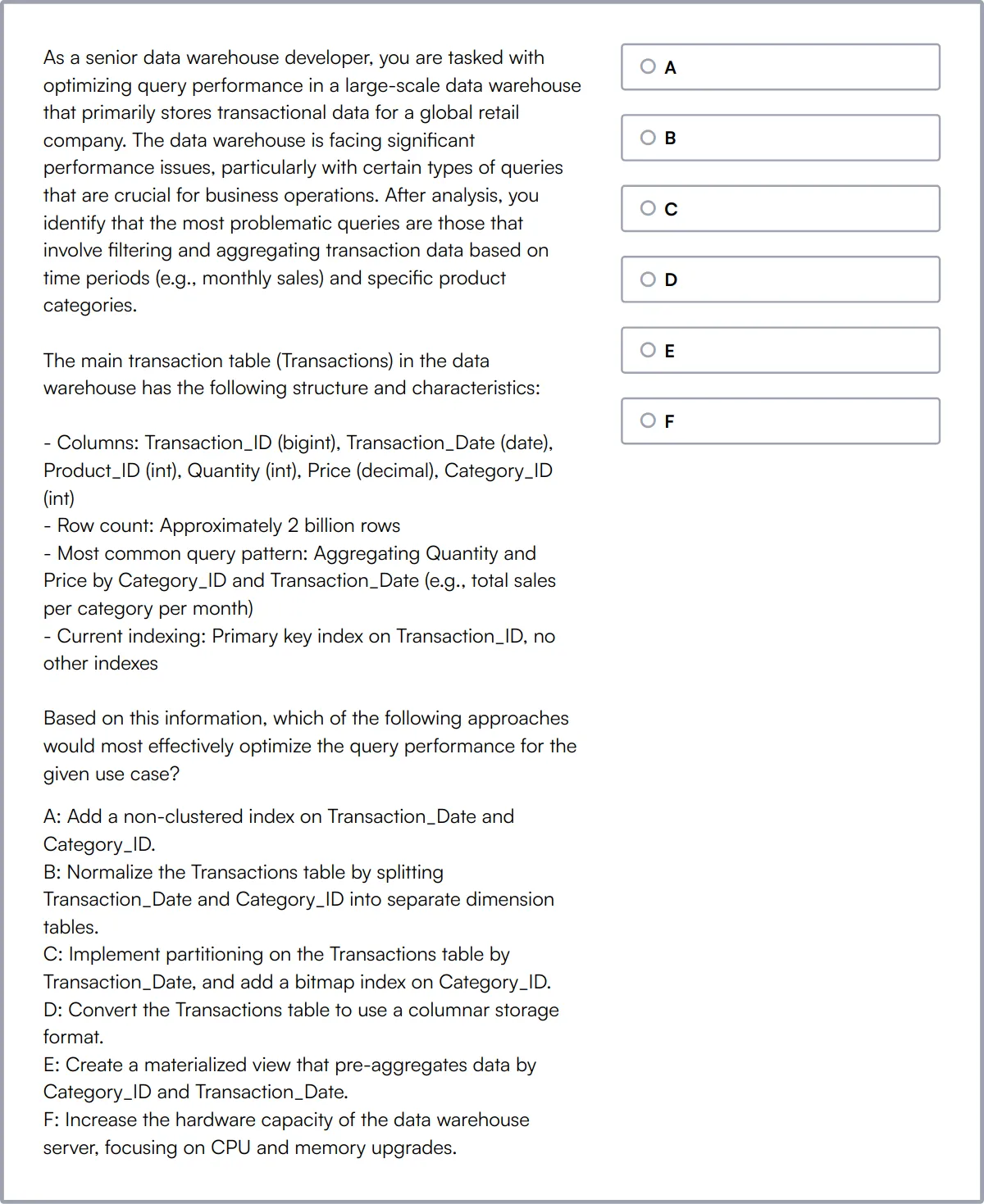
Snowflake Online Assessment Test
The Snowflake Online Assessment Test evaluates candidates on their knowledge of Snowflake's data warehousing architecture and SQL query optimization.
This test covers Snowflake-specific features such as administration, security, and data integration capabilities.
It aims to identify candidates who are proficient in managing and optimizing Snowflake environments, ensuring efficient data handling and security.
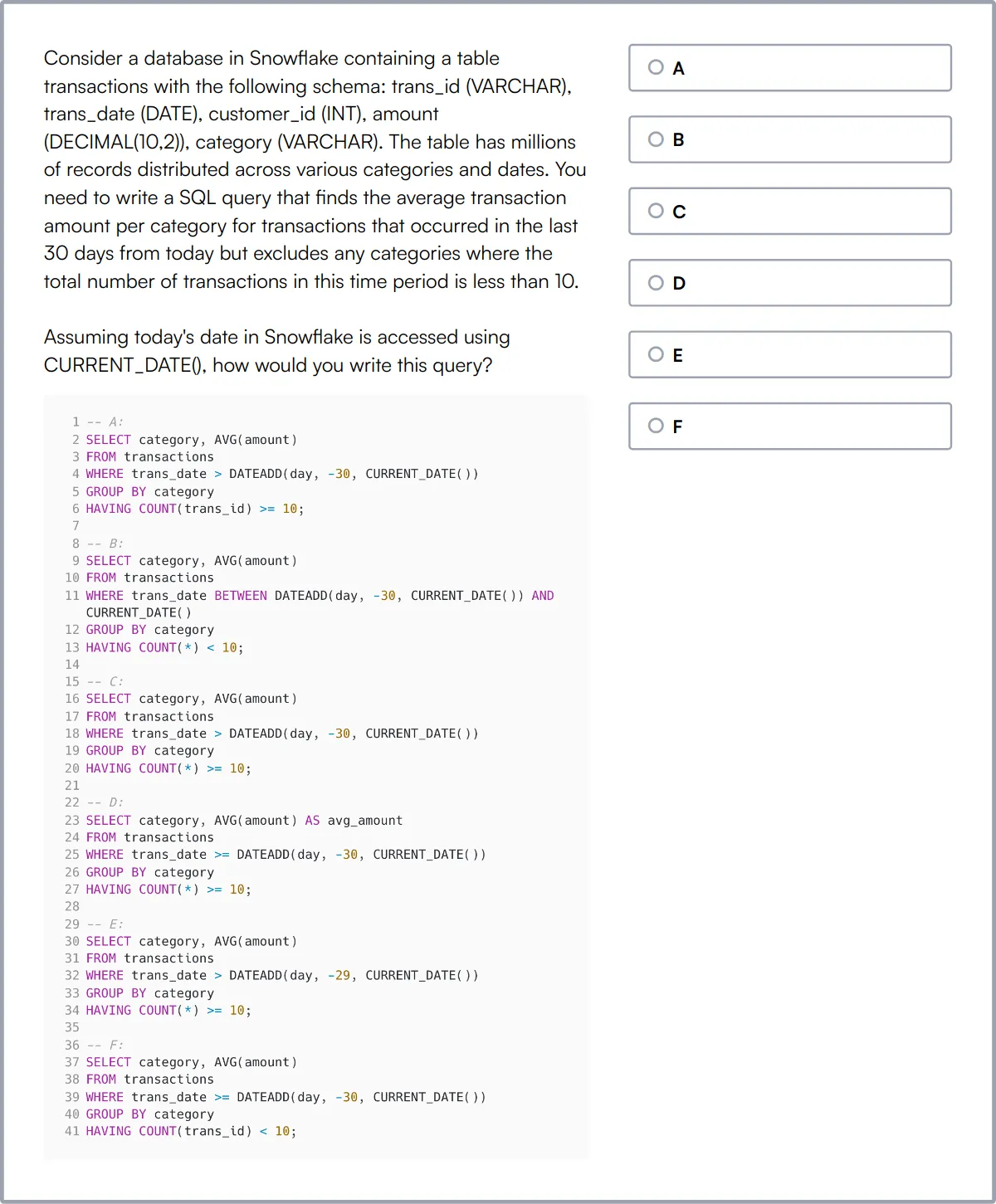
Cyber Security Assessment Test
Our Cyber Security Assessment Test evaluates knowledge across various cybersecurity domains, including network security, cyber attacks, and cryptography.
The test challenges candidates on their ability to identify and mitigate security risks, implement cybersecurity defenses, and understand data security and governance.
Questions also focus on practical skills in managing network security, handling cybersecurity attacks, and applying cryptography techniques effectively.
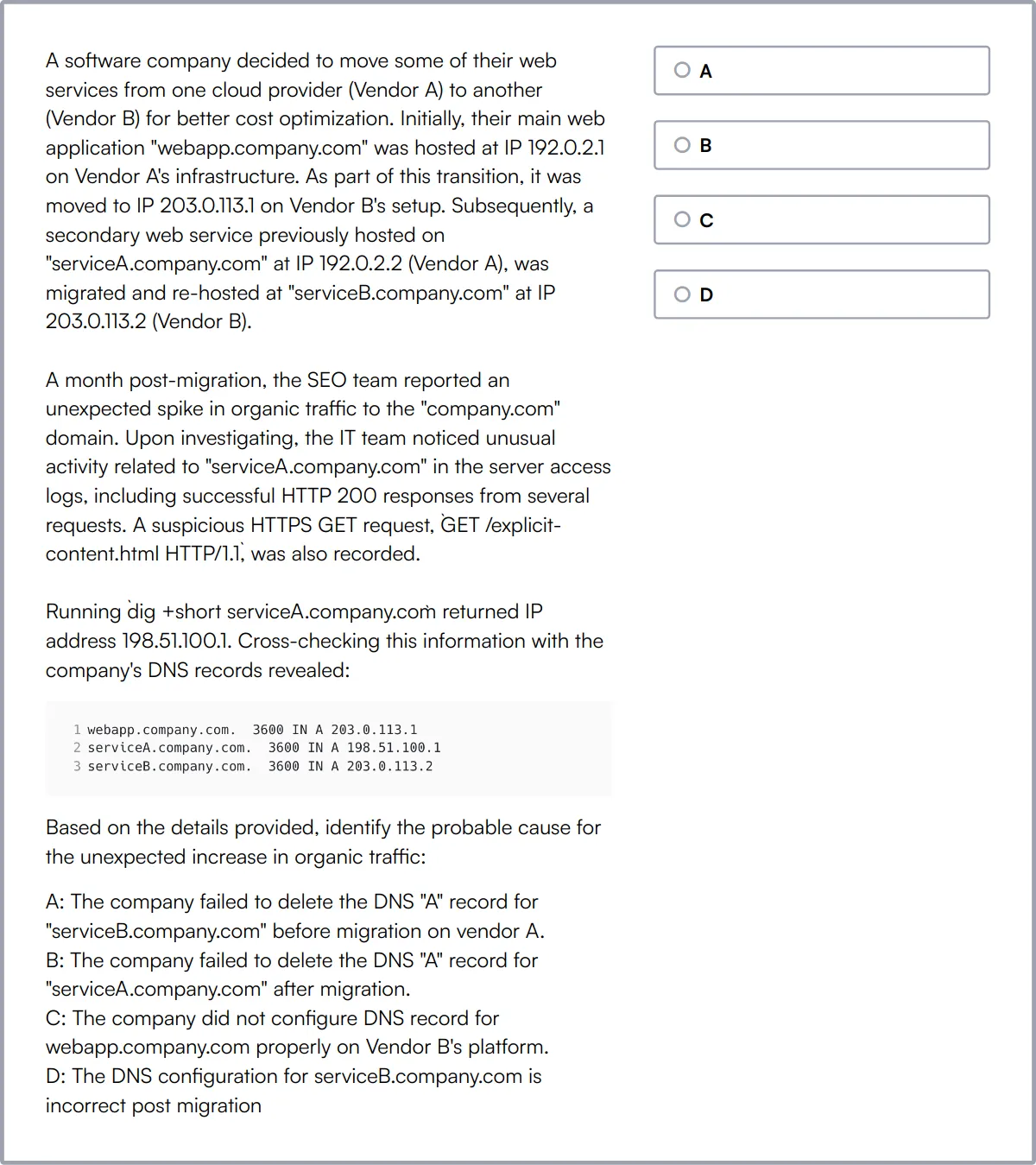
Cloud Computing Online Test
The Cloud Computing Online Test assesses a candidate's understanding of cloud technologies, including service and deployment models, virtualization, and cloud security.
Candidates are tested on their knowledge of cloud infrastructure, scalability, elasticity, and cloud-based storage and database management solutions.
This test also evaluates the candidate's ability to work with cloud networking and orchestration tools, crucial for managing modern cloud environments.
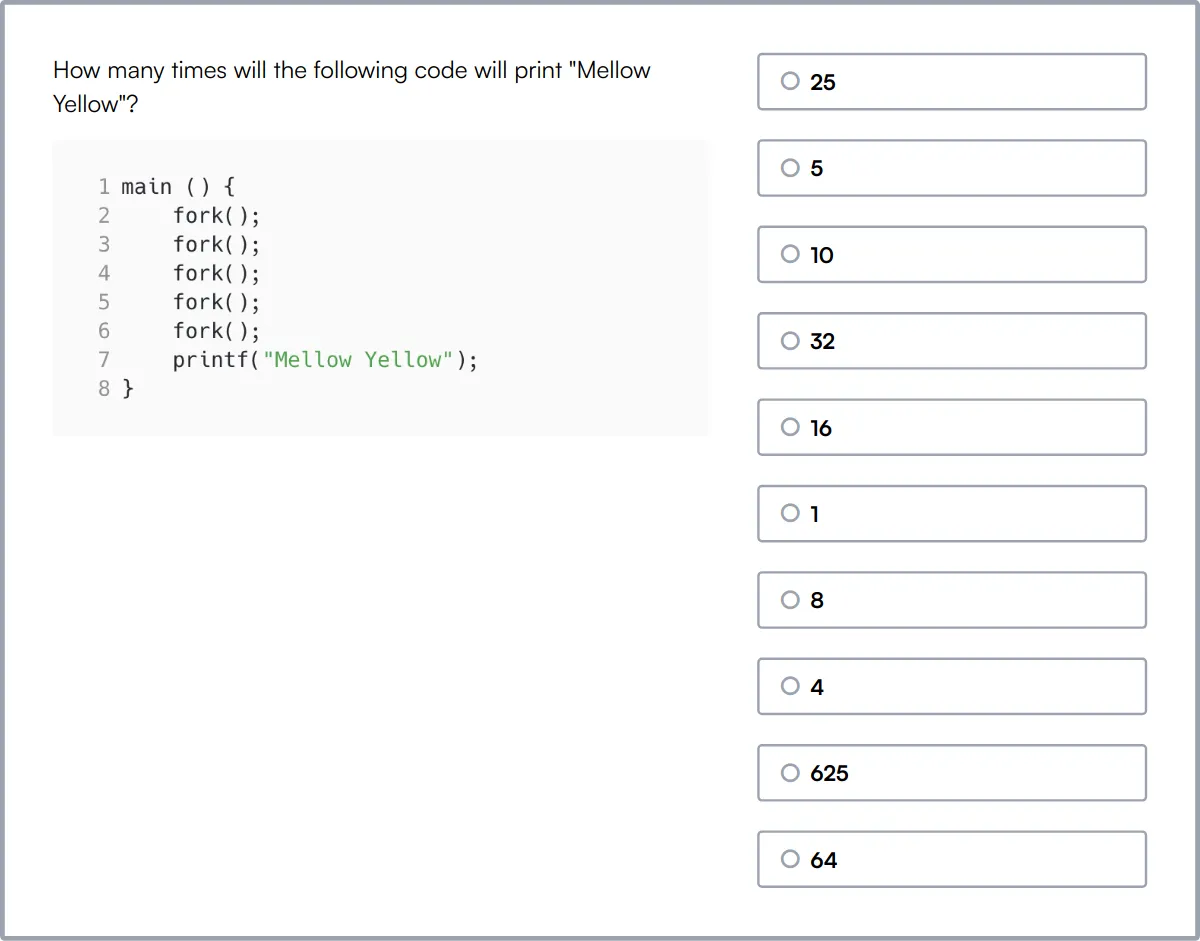
Linux Bash Online Test
Our Linux Bash Online Test gauges proficiency in using the Linux command line and Bash scripting to manage files, processes, and system administration tasks.
The assessment covers a range of topics from basic Linux commands to advanced Bash scripting and networking security.
Candidates are evaluated on their ability to effectively manage system resources, perform text processing, and troubleshoot common issues using Bash and Linux commands.
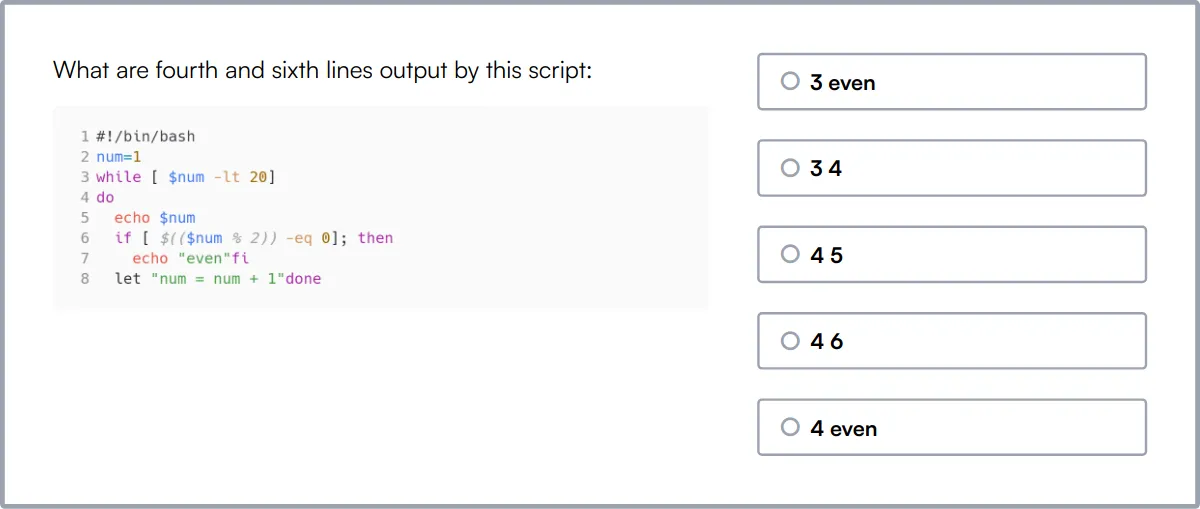
Summary: The 7 key Snowflake Developer skills and how to test for them
| Snowflake Developer skill | How to assess them |
|---|---|
| 1. SQL Expertise | Evaluate a candidate's ability to write complex, optimized SQL queries. |
| 2. Data Warehousing | Assess understanding and implementation of large-scale data storage solutions. |
| 3. Snowflake Architecture | Check knowledge of Snowflake's unique architecture and scalability features. |
| 4. Data Security | Review practices for securing data and compliance with regulations. |
| 5. Performance Tuning | Test skills in optimizing database and query performance. |
| 6. Cloud Integration | Examine experience with connecting and managing cloud services and platforms. |
| 7. Scripting Skills | Assess ability to automate tasks using popular scripting languages. |
Snowflake Online Assessment Test
Snowflake Developer skills FAQs
What SQL skills are necessary for a Snowflake Developer?
A Snowflake Developer should be proficient in writing complex SQL queries, optimizing query performance, and understanding SQL functions and procedures.
How can I assess a candidate's knowledge of Snowflake Architecture?
Ask candidates to explain Snowflake's multi-cluster architecture, data storage, and how it separates compute from storage.
What should I look for in a candidate's data warehousing skills?
Evaluate their experience with designing, implementing, and managing data warehouses, including ETL processes and data integration.
How important is performance tuning in a Snowflake Developer role?
Performance tuning is key. Assess their ability to optimize queries, manage workloads, and use Snowflake's performance features.
What scripting languages should a Snowflake Developer know?
Knowledge of Python, JavaScript, or Shell scripting is beneficial for automating tasks and integrating with other systems.
How can I evaluate a candidate's data modeling skills?
Ask them to describe their experience with designing data models, normalizing data, and using tools like ERwin or Lucidchart.
What role does cloud integration play in Snowflake development?
Cloud integration is crucial. Assess their experience with integrating Snowflake with AWS, Azure, or GCP services.
Why are documentation skills important for a Snowflake Developer?
Good documentation ensures that data processes are transparent and maintainable. Evaluate their ability to create clear, concise documentation.

40 min skill tests.
No trick questions.
Accurate shortlisting.
We make it easy for you to find the best candidates in your pipeline with a 40 min skills test.
Try for freeRelated posts
Free resources



